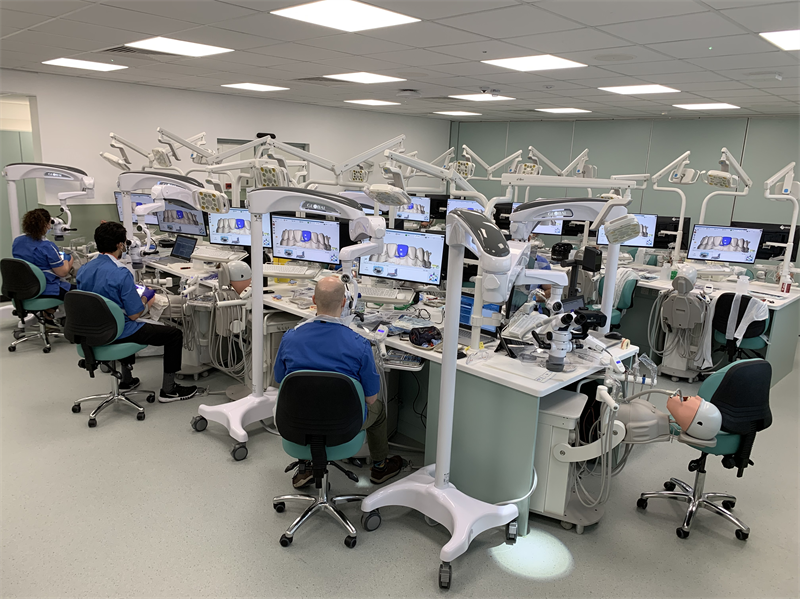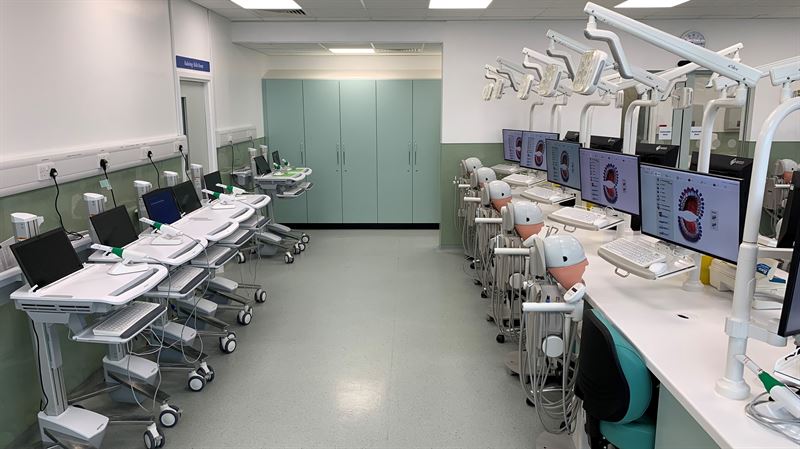King’s College London is a forerunner in adopting digital dentistry in dental education
2021 is Planmeca’s 50th anniversary. As part of the milestone year, we are publishing a series of articles written by our own specialists and by dental experts from around the world. In this article, Dr Rupert Austin tells how Planmeca’s digital equipment is utilised in modern dental education at the Faculty of Dentistry, Oral and Craniofacial Sciences at King’s College London.
Article Nov 23, 2021
The Faculty of Dentistry, Oral & Craniofacial Sciences at King’s College London, United Kingdom, is the first dental school and hospital in the world to incorporate a state-of-the-art digital dentistry haptic suite in dental education. The suite blends clinical, simulation, haptic and CAD/CAM technologies all together, allowing students to train on real human teeth with the help of virtual reality.
At the forefront of this digital investment are Planmeca’s cutting-edge digital CAD/CAM solutions, comprising of ten Planmeca Emerald™ S digital impression scanners, two Planmeca PlanMill® 40 S milling machines, and a Planmeca PlanMill® 50 milling machine. Planmeca’s industry leading technology allows King’s College London’s students to experience, learn and train on the very latest in modern digital CAD/CAM technologies.
The simulation facilities at King’s College London are equipped with Planmeca’s CAD/CAM devices and software.
King’s College London is also the first university in the world to integrate SIMtoCARE haptic simulators with the Planmeca Romexis® software. This allows students to train on the simulators using digital models of actual human anatomy. The anatomy can be scanned into the Romexis software, transferred into the simulators and then the students can experience haptic feedback as they would from physical anatomy - truly ground-breaking in dental education!
The students are thus able to access a complete digital clinical workflow from intraoral scanning of real patients, to practising procedures using advanced augmented reality haptic workstations. Simulations are combined with hands-on involvement of King's College London’s teaching staff at every stage. The staff providing demonstrations, real-world experiential context, and immediate feedback is the thread that unites all of these lab-based clinical sessions.

The high-fidelity haptic suites at King’s College London.
Additionally, King’s College London is at the forefront of CBCT imaging in cooperation with Guy’s Hospital, London. This is an area where Planmeca also has a long-standing association by having been able to provide proven ultra-low-dose imaging solutions. King’s College London is not only harnessing Planmeca’s pioneering Planmeca Ultra Low Dose™ protocol provided by our Planmeca ProMax® family of CBCT machines but also Planmeca’s ethos of better care through innovation.
The King’s College London’s continued investment in a seamless digital ecosystem has also been recognised by other institutions, who are looking to implement and adopt digital dentistry into their curriculums. They strive to be able to offer and provide their dental students the ability to train on the very latest in digital dentistry solutions – by benchmarking ours.
King’s College London sees Planmeca as a valuable partner in promoting the benefits of digital dental treatments, in bringing new level of quality assurance, documentation and precision to the care delivered, and in helping a new generation of dentists adopt the latest technological advancements in their everyday work, ensuring the best possible level of patient care.
Dr Rupert Austin, BDS, MClinDent, PhD, is a Senior Clinical Lecturer and Honorary Consultant in Prosthodontics at the Faculty of Dentistry, Oral & Craniofacial Sciences at King’s College London, UK. He graduated from the University of Manchester in 2006 and completed his PhD on enamel erosion in 2011. Dr Austin specialises in prosthodontics and has been treating complex prosthodontic cases as a private practitioner in the UK for close to 10 years. His research has mainly focused on enhancing the diagnosis and treatment of dental hard tissue pathologies using innovative optical imaging technology.
Images: Courtesy of King’s College London Faculty of Dentistry, Oral & Craniofacial Sciences


